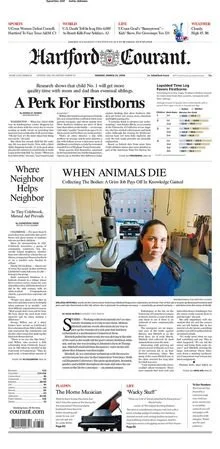Don Pesci: The news media have a duty to cause turbulence
The Hartford Courant, which began as a weekly called the Connecticut Courant on Oct. 29, 1764, and become a daily in 1837, is considered the oldest continuously published newspaper in America.
VERNON, Conn.
If we can but prevent the government from wasting the labours of the people, under the pretense of taking care of them, they must become happy."
-- Thomas Jefferson to political philosopher Thomas Cooper, Nov. 29, 1802.
How much time should Connecticut politicians spend consulting Twitter and other like venues?
It depends how much time they have to waste. Positive comments are self-affirming, negative comments put a dent in swelling egos. Such sites are not a reliable guide to the majority temperaments of voters.
Do Washington, D.C., political-advisory groups offer winning advice to state non-incumbent politicians?
That has not been the case in Connecticut in the recent past. We all know that the second thing that happens after a non-unionized company becomes unionized is that “going out of business sales” are posted. The second thing that happens after a non-incumbent in Connecticut ties his or her political ascent to a Washington, D.C., campaign-advisory group is that the politician loses the race. State politics really is local. And politicians easily lose themselves in the gap that forms when they adopt unthinkingly a program hatched by underwriters detached from state issues. However, the financing of state campaigns is sometimes national. So, Washington contacts may be both financially necessary and politically lethal.
Is straddling the fence on “cultural issues” in Connecticut useful or not?
It is not useful. There is a problem with the nomenclature. Any issue not strictly economic is cultural. And there are very few economic issues that have no cultural ramifications. Inflation, for instance, is both an economic and a cultural issue, because excessive spending, excessive borrowing, and the devaluation of the currency through excessive printing of money causes cultural upheaval.
Straddling the fence on any issue, cultural or economic, does not generally achieve a positive purpose, because the straddler must engage in some form of dissimulation to garner the votes of both those who support A and not-A.
Now, political compromise is not the same sort of thing as embracing ends that exclude each other. You cannot both jump into the pool and not jump into the pool. But you may fashion an arrangement between swimmers and non-swimmers that may benefit both parties — for example by regulating the time during which the pool may be used. Gun regulation and abortion regulation are instances of this kind.
How much influence have Connecticut news media had in shaping the destiny of the state?
That depends on uniformity of purpose. A state’s media should be intellectually diverse enough to accommodate rival political viewpoints and, ideally, state media that have not simply surrendered to the status quo should be contrarian. This is what William Randolph Hearst meant when he said a newspaper “should have no friends.”
Politics is too important a business to leave entirely in the hands of incumbent politicians. When a state’s media offer political views that do not differ markedly from those officiating in what we might call a nearly permanent one-party state, it is fair to say that the nature of the state is what it is because the nature of journalism is what it is.
We are living when it has become exceedingly dangerous to let the reigning power think for us. As an institution, the media, which have changed a good deal over the years, have in the past been a sector whose members have jealously guarded their indispensable mandate – to think fearlessly, to say the thing that is, without fear or favor.
That is what a free press really means. Thomas Jefferson, the archangel of First Amendment freedoms, called our attention to the importance of a free press when he said that constitutional government in a republic, once destroyed by politicians, could be recovered and restored, provided that the press remained free.
In a letter to Edward Carrington in 1787, Jefferson wrote, “Were it left to me to decide whether we should have a government without newspapers or newspapers without a government, I should not hesitate a moment to prefer the latter. But I should mean that every man should receive those papers and be capable of reading them.”
Jefferson served as president from March 4, 1801, to March 4, 1809. The Jefferson/John Adams campaign, in 1800, was especially bruising. Yet we find Jefferson writing to the Marquis de Lafayette in 1823, “The only security of all, is in a free press. The force of public opinion cannot be resisted, when permitted freely to be expressed. The agitation it produces must be submitted to. It is necessary to keep the waters pure.” The turbulence aroused by a free press, Jefferson stressed, is “as necessary in the political world as storms in the physical… a medicine necessary for the sound health of government.”
Everyday upon awakening, reporters should ask themselves, “What turbulence have I caused today? Are we still free?”
